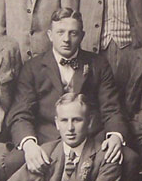Note 1: Robert Seddon died on tour after a boating accident. Andrew Stoddart became captain for the remainder of the tour.Note 2: Matthew Mullineux decided that after losing the first test that he should withdraw from further test matches, handing on field captaincy to Frank Stout, but remained tour captain.
Note 3: David Bedell-Sivright was injured during the first test. Teddy Morgan took over captaincy on the field but Bedell-Sivright remained tour captain.
Note 4: The team that John Raphael captained was not selected by the four Home Nations governing body, but had been organised by Oxford University and billed as the English Rugby Union team. However, it was considered the Combined British team by Argentina because it also included three Scots.
Note 5: Jack Jones was captain for the first test, but Tommy Smyth remained the tour captain.
Note 6: Bleddyn Williams captained in the third and fourth tests v New Zealand and the first test v Australia.
Note 7: Cliff Morgan captained in the third test.
Note 8: David Watkins captained in the second and foruth tests v New Zealand.
Note 9: Michael Owen captained the Lions in the first tour game, the test vs. Argentina in Cardiff. Brian O'Driscoll was injured at the beginning of the first test against New Zealand. Gareth Thomas replaced him as tour captain.
Note 10: Sam Warburton was injured in the second test. Alun Wyn Jones replaced him as captain for the third test.
Note 11: Tour captain Sam Warburton was named on the bench for the first test. Peter O'Mahony was the captain on the field.
Note 12: Tour captain Alun Wyn Jones left the squad for 17 days due to an injury in the first warm-up match, and was replaced by Conor Murray temporarily. 